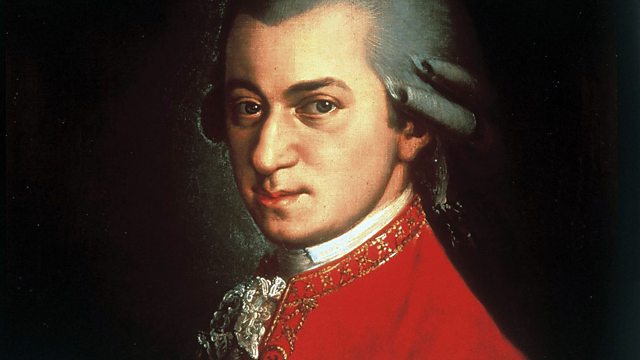
Music and Skittles
Donald Macleod explores the miraculous chamber music of Mozart's Vienna years. 4/5. A penchant for Kegel, a Trio for Natschibinischibi and 'Anglomania' hits Vienna.
This week Donald Macleod explores the miraculous chamber music of Mozart's Vienna years. Today, a penchant for Kegel; a Trio for Nàtschibinìschibi; and 'Anglomania' hits Vienna.
Kegel - skittles - was a popular leisure-pursuit in late-18th-century Vienna. There were bowling alleys in public parks, and some people even went so far as to set them up in their own gardens - among them Mozart and his wife Constanze, both keen players of the game. Evidently Mozart was prone to musical doodling between turns, and on one occasion in July 1786, according to his inscription on the score, he produced a set of horn duos "during a game of skittles". Not long after dashing off those throwaway little numbers, Mozart produced a real masterpiece: his serene Trio in E flat for clarinet, viola and piano - better known as the Kegelstatt - that's to say, Bowling Alley - Trio. Why it acquired this implausible nickname isn't clear, but it seems to have been added by a publisher, perhaps due to some confusion stemming from the story of the horn duos. Mozart probably wrote it to perform with two good friends - the great clarinet virtuoso Anton Stadler, whom he honoured with one of his silly nicknames: Nàtschibinìschibi; and one of his most talented piano pupils, Franziska von Jacquin. A more transitory fad than Kegel was the 'Anglomania' that seized Vienna's fashionable society during this period, the men donning "round hats, large greatcoats of rough material, full neckerchiefs, dark frock-coats with high collars, boots and spurs", and the women showing "a liking for horse-riding, tea, hats, anglaise dances, speaking English and reading books, and a general preference for any male, young or old, handsome or hideous, who lives any where between the Isle of Wight and Orkney". The Viennese, however, were notoriously fickle in their tastes, and by the time Mozart wrote his G minor String Quintet, K 516, he must have been well aware that his music was now decidedly out of fashion. It's tempting to hear despondency at his personal situation in the opening movements of the Quintet, but after a doom-laden introduction, the finale throws tragedy aside and brings a sunny resolution to a work that began in the depths of despair.
12 Duos for 2 horns, K 487; No 1, Allegro
Iman Soeteman and Jan Peeters (horns)
Trio in E flat for clarinet, viola and piano, K 498 ('Kegelstatt')
Martin Fröst (clarinet)
Antoine Tamestit (viola)
Leif Ove Andsnes (piano)
String Quintet in G minor, K 516
Grumiaux Trio (Arthur Grumiaux, violin; Georges Janzer, viola; Eva Czako, cello)
Árpád Gérecz (violin 2)
Max Lesueur (viola 2).
Last on
Music Played
-
![]()
Wolfgang Amadeus Mozart
12 Duos K.487
- DG: 483 3000.
- DG.
- 4.
-
![]()
Wolfgang Amadeus Mozart
Trio in E flat "Kegelstatt", K498 (2nd mvt)
Performer: Martin Frost. Performer: Antoine Tamestit. Performer: Leif Ove Andsnes.- BIS 1893.
- BIS.
- 4.
-
![]()
Wolfgang Amadeus Mozart
String Quintet in G minor K.516
Performer: Arpad Gérecz. Performer: Max Lesueur. Ensemble: Grumiaux Trio.- PHILIPS : 416-486-2.
- PHILIPS.
- 5.
Broadcast
- Thu 7 Sep 2017 12:00���˿��� Radio 3
Beethoven Unleashed – the box set
What was really wrong with Beethoven?
Composers A to Z
Who knew? Five eye-opening stories from Composer of the Week
Five reasons why we love Parry's Jerusalem
What is the strange power of Jerusalem which makes strong men weep?
A man out of time – why Parry's music and ideas were at odds with his image...
The composer of Jerusalem was very far from the conservative figure his image suggests.
Composer Help Page
Find resources and contacts for composers from within the classical music industry.





